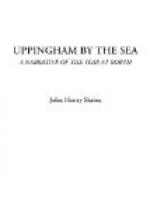Aran Mowddy, but will be anxious to explain this evening,
that if the view from the summit was lost in mist,
that was more than made amends for by “the enchanting
glimpses caught through the cloudrifts in the descent.”
The day wears on, and signs of fatigue appear.
Some are wondering what Miss Roberts of the famous
“Lion” at Dolgelley has got for their dinner.
Small boys begin to declare that they could go on
at this pace for any time you like; this is nothing
to what they did last year in the Highlands; something
like mountains there, you know! The sun
is far in the west when the knot of adventurous reconnoitrers
who have gone farthest afield mount the train at Portmadoc.
Nearer home they thrust heads out of window to rally
their friends who join them on the poverty of their
exploits. These, taciturn with weariness or hunger,
find they haven’t their best repartees at command.
But they are all smiles and good humour again at
the news that young So-and-so, with two or three more,
who had strayed from their party, were sighted rushing
along, all dust up to their eyes, to catch the train
as it moved out of the station. There is no
other to-night; but our good hostess, we know, will
give the youngsters tea, put them to bed, and forward
them prepaid next morning. At length the last
station has poured in its tributary to the volume of
the returning multitude, and the train glides softly
on between the brimming estuary and the marsh golden
with sunset. The full stream is peaceably disgorged
again through the narrow station-door, and distributes
itself along the tea-tables. Sleep comes down
upon tired limbs and easy consciences, and the day’s
glory throws the rich shadows of some Midsummer Night’s
Dream far into the bright dawn of another working
day.
It was never professed that on these occasions we were doing other than taking a holiday. If, together with mountain air and the scent of heather, a boy drank in a love and understanding of Nature, and felt, possibly for the first time, the inspiration of beauty, then probably hours were never spent in a class-room to more profit than were these on the slopes of Cader or Plinlimmon, or along the banks of Mowddy.
CHAPTER IX.—THE FIRST TERM: MAKING HISTORY.
“Happy is the people which has no history.” Stands this too among the beatitudes? Surely this were a fit evangel only for sheep and oxen, or for such human kine as covet the fat pastures rather than the high places of existence. For whoso is ill-content to live long and see good days, save he may also live much and see great days, will not be so tamely gospelled, seeing that every past is mother of a future, and that there is no history but is a prophecy as well.
In our late digression on the conditions and circumstances of our life at Borth, we have somewhat anticipated




